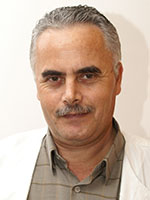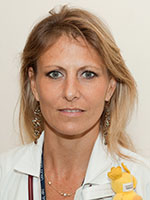Summer vacation is already here - high schoolers started summer vacation this week, and the rest of the kids will follow in the next few days. Aside from fun at the beach, camp and hikes, it's wise to pay attention to the dangers the summer and hot weather bring with them. How do you make sure that you and your children have fun without getting hurt while on vacation? Experts from Hillel Yaffe present some tips and advice.
|

Dr. Jalal Ashkar
|
Prevent accidents at home and outside
Dr. Jalal Ashkar, Director of the Emergency Medicine Department at Hillel Yaffe, says that accidents at home during summer vacation are the statistical result of children spending more time at home. Therefore, leave children and toddlers at home alone, without adult supervision, as little as possible. Additionally, there are some things you can do to help keep your children safe at home:
-
Make sure that electrical outlets that are not in use are closed with special plugs.
-
When cooking, make sure that the handles of pots and frying pans face inward, out of reach of children. You should also try to use the back burners on the stove.
-
Make sure that the electric kettle is located on a stable, safe surface in order to prevent it from falling and spilling boiling water.
-
Keep medications, cleaning supplies and dangerous objects out of the reach of children by locking them in a special cabinet.
-
Additionally, even when leaving the house, make sure to take safety measures when riding on bicycles, driving in the car, etc.
-
During summer vacation, children are very active on their bikes, skates, scooters, roller blades and more. By wearing helmets, elbow and kneepads, you can help prevent serious injury in case of a fall.
-
When traveling in the car - make sure that the children and wearing seat belts, even when only driving a short distance. It is important that toddlers are strapped properly in appropriate car seats. By fastening seat belts, you can significantly reduce the severity of injury if involved in an accident.
|

Dr. Moni Litmanovich
|
Follow several simple rules when at the beach and the pool
Dr. Moni Litmanovich, Director of Hillel Yaffe Medical Center's General Intensive Care Unit, states that cases of drowning are 100% preventable, if children are not left alone on the beach or at the pool where there is no lifeguard on duty and where there is no easy access for evacuation.
"When dealing with drowning," said Dr. Litmanovich, "the time it takes for assistance to arrive is extremely critical. The harm that can occur is directly related to the length of time from drowning to resuscitation/assistance. A drowning victim, whose lungs are filled with water, cannot receive the oxygenation and exchange of gases that are vital to the function of the body's different systems, and this can lead to irreversible harm to the body."
The first things to be done in case of drowning:
-
If there is a person in the immediate vicinity who is experienced in conducting resuscitation, initial resuscitation should begin immediately, at the same time you call for help.
-
It is important to understand that some of the people who drown are also injured from rocks and sharp objects at the same time, and this can lead to serious orthopedic injury. Therefore, do not move the victim unnecessarily after removing them from the water.
-
You can remove any undesirable secretions that may be blocking the airway. Do not try to give the victim regular water or pour regular water on them.
|

Dr. Adi Klein |
Diarrhea, vomiting and dehydration - how do you recognize them? What should you do
"Diarrhea and vomiting are also common occurrences in the summer - especially in children. They are mainly due to viruses in the enterovirus family, which is very typical of the summer months," says Dr. Adi Klein, Director of the Pediatrics Department at Hillel Yaffe." Infection is generally passed through contact, but in some cases it may also be contracted through the air.
The first sign is lots of vomiting at the beginning, followed by fever and diarrhea. The diagnosis of the specific virus is purely clinical, based on the "season" and the symptoms. Treatment is generally immediate and designed to ease the symptoms, and the child usually gets better within several days. However, if not treated in time, it can lead to serious dehydration and even damage to the central nervous system.
You should seek medical attention or go to the hospital whenever a child cannot take and absorb fluids, whether due to excessive vomiting or diarrhea - whenever consciousness is affected or when they suffer from strong headaches, they should be taken urgently for medical assessment. By making sure to wash hands, bathe and drink lots of fluids, most cases of infections by this type of virus can be prevented.
"When it comes to drinking in the summer, " added Dr. Jalal Ashkar, "It is important to take breaks to drink, to wear hats, stay in the shade and wear a high-SPF sunscreen. Symptoms of dehydration generally include excessive drowsiness, and even becoming apathetic, muscle pain, headaches, less frequent urination, rapid pulse, higher temperature and ongoing vomiting."
Dehydration is treated by giving fluids at a high frequency. When dealing with children and toddlers, if they refuse to cooperate and become apathetic, go to your physician or emergency room to receive IV fluids. Note that when you become dehydrated, your sense of thirst is affected, and therefore, thirst is not an indication of dehydration.
Protect yourself against bites and stings
In the summer the appearance of poisonous insects and reptiles increases. In Israel, the Palestine Viper is quite common. Its bite can lead to local swelling, redness and even stomach pain, vomiting, drowsiness, irregular heart beat and excessive blood clotting. In the event of a snake bite, Dr. Ashkar said that it is important to try to avoid movement, to try to immobilize the affected limb and to take the victim to the emergency room immediately. Do not try to suck out the venom or to apply a tourniquet or ice. Do NOT try to connect the two bite points or to use alcohol to sterilize and soothe the site. Such actions may increase blood flow and accelerate the spread of the venom. This is also true when stung by a yellow scorpion and the Black Fat-Tail Scorpion.
Snake bites and scorpion stings may lead to lowered blood pressure, instability, neurological damage and in extreme cases even to death. It is therefore extremely important to pay attention to the child or adult's physical condition, especially on hikes, picnics or when in agricultural areas, where the risk of encountering snakes and scorpions increases in the summer.
Additionally, do not pick up rocks or walk barefoot in the bushes or in sand. You should also be cautious in agricultural areas. When going on hikes, make sure to wear high, closed shoes and not sandals, which will help alleviate unnecessary risk.
In short, summer vacation is "tough time" when it comes to children and injuries. Make it a point to follow the safety rules to make sure that everyone gets home safely.













.jpg?BannerID=39)

